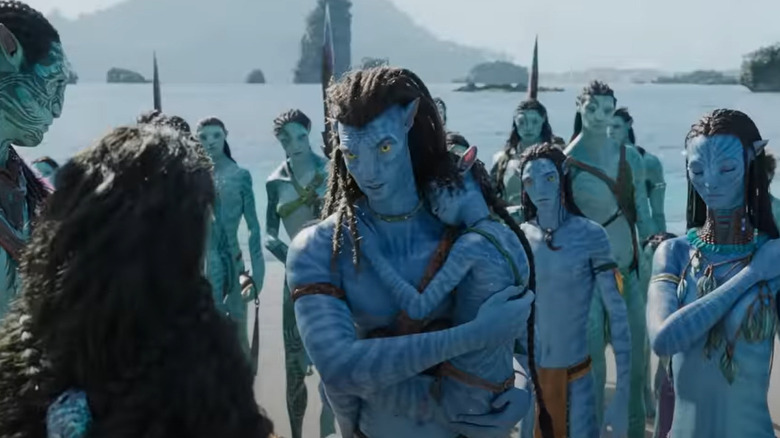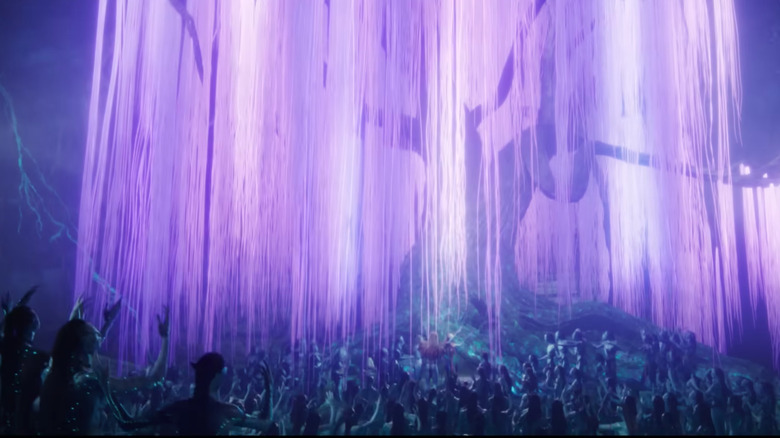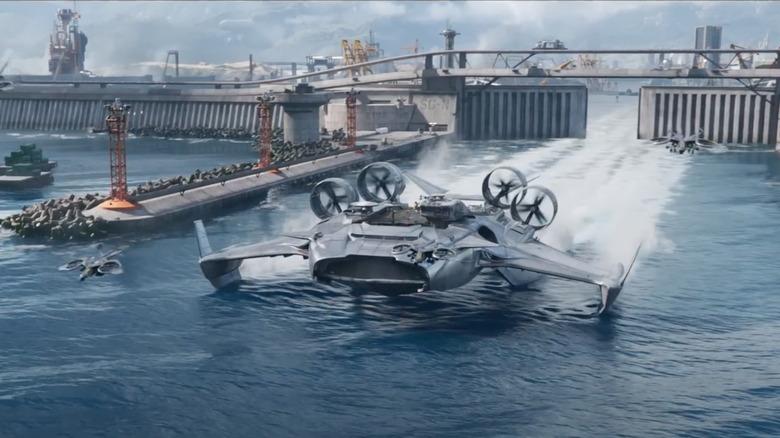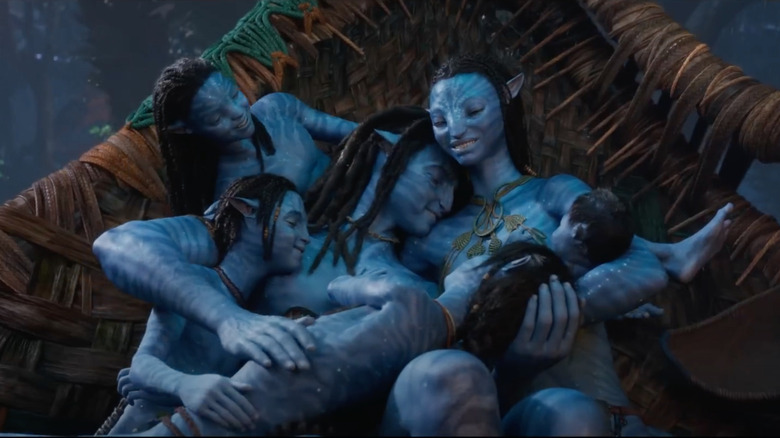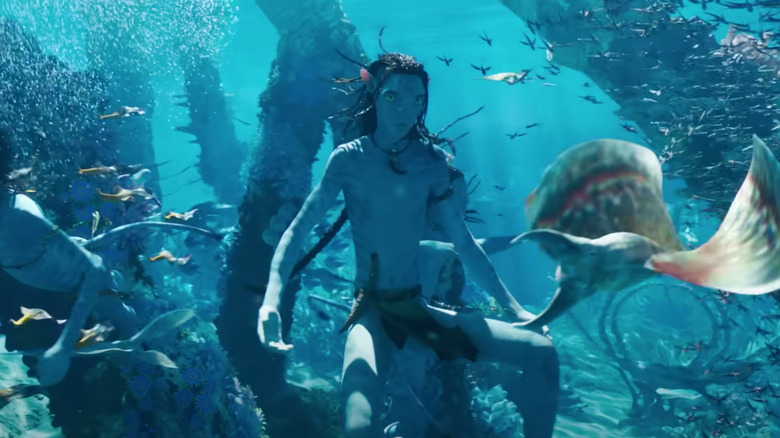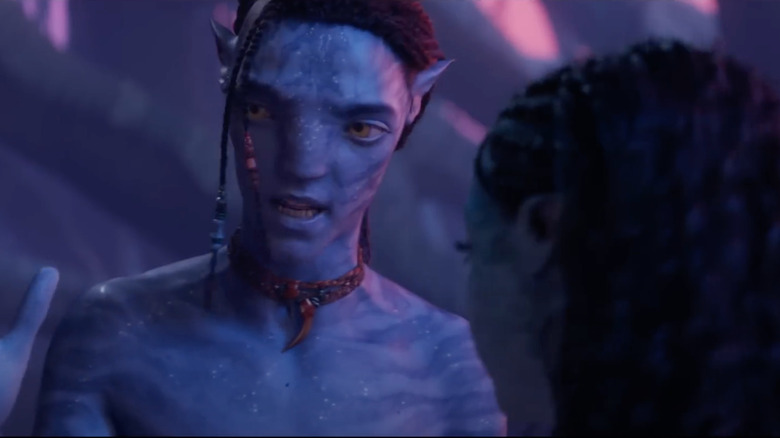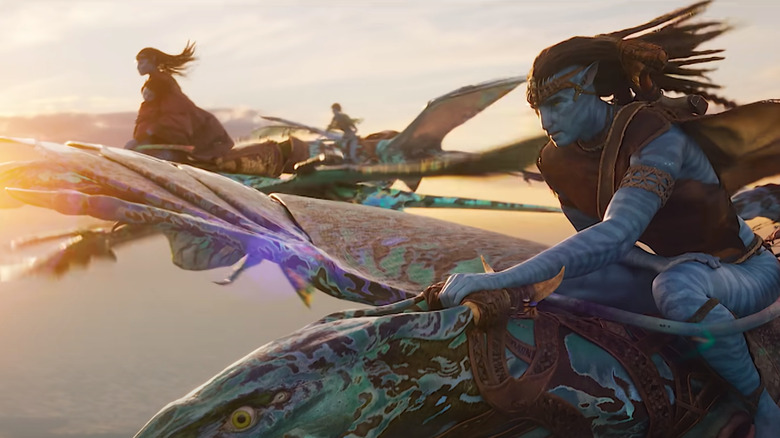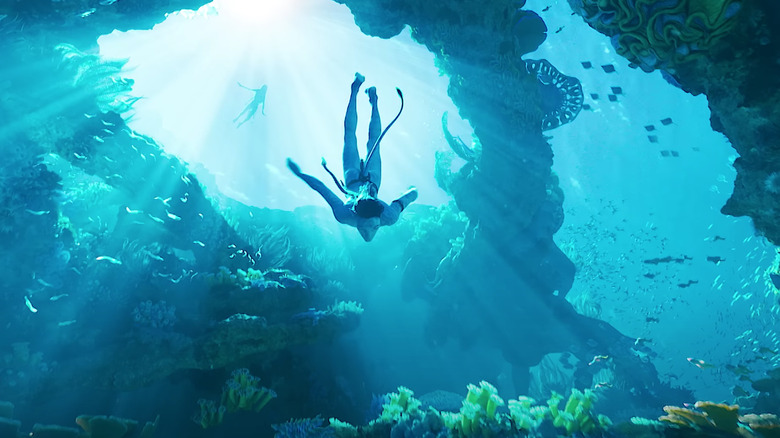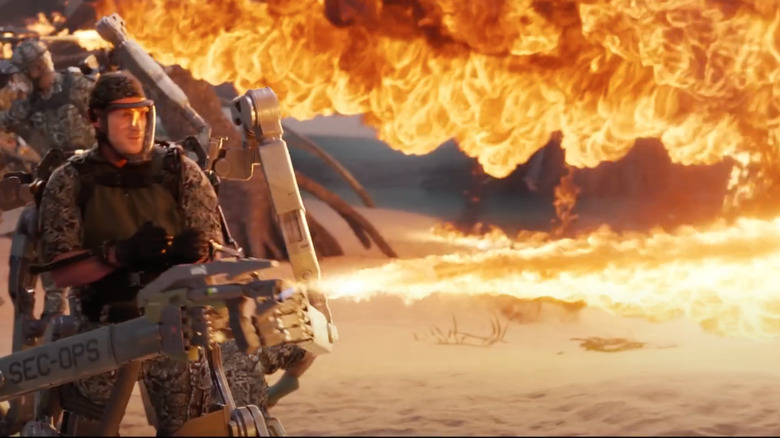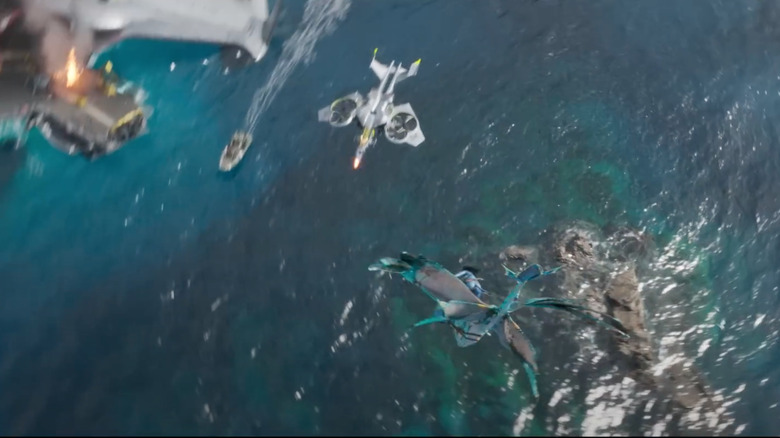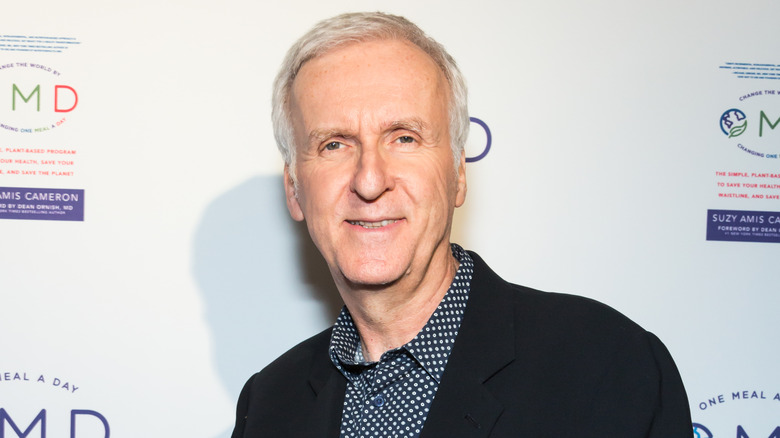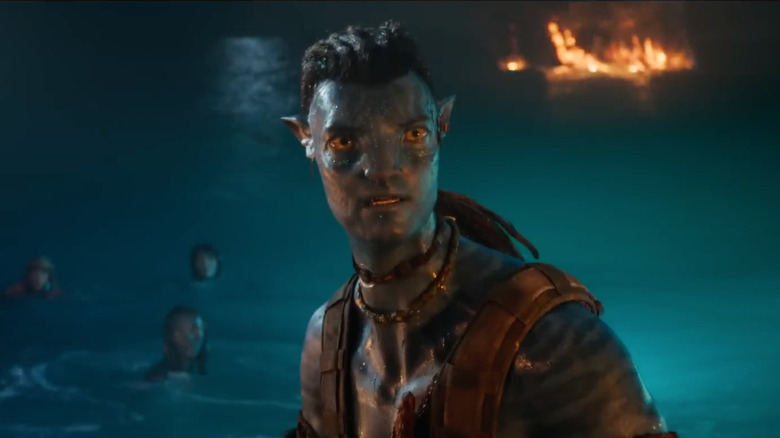How Avatar: The Way Of Water Beat The Box Office Odds Despite Its Massive Budget
Like many of James Cameron's films, "Avatar: The Way of Water" became a crowd-pleasing box office juggernaut. In fact, it even beat out "Top Gun: Maverick," which was the top earner of 2022 until early in the year.
While even the director had doubts as to whether his latest "Avatar" installment would deliver the big bucks, it's still making money hand over first. As has been said before, it is unwise to bet against James Cameron. As of this writing, "The Way of Water" has made over $1.9 billion and should hit $2 billion total in the near future.
Which isn't to say that "The Way of Water" was a safe or easy bet for a major studio. "Avatar" films are tremendously expensive to make, and there was no guarantee that this movie would make a profit. But if there's no risk, it's clear Cameron wouldn't be interested. You get the impression he relishes in pulling off the supposedly impossible, and he's done it time and time again.
Success or failure usually isn't determined by one thing; more often, it's a lot of little things that add up. Here's why Cameron won one of the riskiest bets of his career and "Avatar: The Way of Water" ended up beating the odds.
There was incredible anticipation for the sequel
It's been 13 years since the first "Avatar" was released, and many fans spent that time waiting to see what James Cameron would come up with next. Given that Cameron ups the ante of spectacle and technology with every film, another "Avatar" movie certainly wasn't going to be ready right away. Thankfully, fans didn't forget about "Avatar" in the interim. (Although Edie Falco, who shot her scenes for "Avatar: The Way of Water" four years ago, famously assumed the movie must've come and gone already.)
Yet even Cameron himself, who rarely displays any self-doubt, wondered if audiences would still show up for new "Avatar" movies. As he explained to The Hollywood Reporter at the time, "There's skepticism in the marketplace around, 'Oh, did it ever make any real cultural impact?' 'Can anybody even remember the characters' names?'"
He also knew the odds that the "Way of Water" would make its gargantuan budget back weren't exactly in his favor. "We have to, literally, be in the top five grossing films in history to succeed," he told THR. "That's a silly target."
Audiences couldn't wait to go back to theaters
Since the pandemic hit, there's been a lot of speculation and fear that movie theaters could be in trouble. If theaters were going to come back from the COVID-related lost revenue and a culture-wide shift to streaming entertainment, some felt it would take a big movie to get people out of the house.
Along with "Top Gun: Maverick," "Avatar: The Way of Water," was the big film audiences were waiting for — it's a movie made to be seen on the biggest screen you can find. And James Cameron is more than happy to bring people to theaters.
As Cameron explained to Variety, "We're going back to theaters around the world. They're even going back to theaters in China where they're having this big COVID surge. We're saying as a society, 'We need this! We need to go to theaters.' Enough with the streaming already! I'm tired of sitting on my ass."
It got mostly strong reviews
Some blockbusters are practically critic proof; other times, enough bad reviews and word of mouth can definitely hurt a movie, even if it seems too big to fail. Luckily, "Avatar: The Way of Water" didn't fall into the latter category, as it got mostly positive reviews from critics, even if some weren't crazy about the simplistic storyline and corny dialog. The film garnered largely positive scores on Rotten Tomatoes from both audiences and critics.
The Hollywood Reporter called it "a hugely entertaining follow-up to the 2009 sci-fi eco-thriller that remains the top-grossing movie of all time." THR added, "Just ignore the drippy dialogue and get wet." Variety wrote, "The underwater sequences are beyond dazzling — they insert the audience right into the action — but the story is a string of serviceable cliches."
There have been some negative reviews for "The Way of Water" as well. The Guardian, for instance, suggested the story is much too thin to justify the 192-minute runtime, and described the movie as "soggy" and "twee" in a headline.
The family angle gives audiences more to invest in
There's a key phrase in "Avatar: The Way of Water" — "This is our family. This is our fortress." And indeed, the latest "Avatar" movie has a new element that's endearing to audiences, and that's the family angle.
Dealing with his own kids has given James Cameron a new perspective as a storyteller. As Sigourney Weaver explained to Variety, "The story is about family, about our families trying to stay together [and] the lengths to which we all go to protect each other and protect the place where we live. It's very much based on Jim's family and his joy in the family; and also, how vulnerable you are when you have children."
Cameron also discovered, to his chagrin, that some of his kids weren't that nuts about "Avatar." As he said (via Yahoo UK), "I've got five [kids], they're all different ages and they're not necessarily big fans of the first 'Avatar.' 'That's dad's thing, you know what I mean. But they do like the new film."
He added that one focus of the film is "teenagers and that deeply anxious, kind of chaotic time in our lives. I remember it from when I was that age and I remember it as a father from when my kids were that age. ... That's what I wanted to write about."
The immersive 3D takes audiences inside the movie
Like the first "Avatar" film, "Avatar: The Way of Water" uses 3D in a groundbreaking way, making the action seemingly come to life off the screen, and bringing audiences inside the world of Pandora.
When the first "Avatar" took 3D to a new level, Hollywood hoped the technology would be the salvation of the industry. As Cameron explained to Yahoo UK, "If you think about the way it worked back then, [3D] was a novelty. Now it has found its level as a consumer choice. At the time we had 6,000 screens worldwide that were 3D screens, now we have 120,000."
With 3D, Cameron found an important tool to make the world of Pandora seem more real to audiences, where the fantastical nature and life on the planet seemed completely believable.
As Cameron said (via EW), "In dreams, we believe we're in the situation while we're dreaming. And that's what I wanted to accomplish with the new film. ... Through the world-building and through the presentation and bright laser 3D and so on, you're there. You can see every leaf on the tree. You feel like you can reach out and touch it."
It had no competition
Whenever a big blockbuster movie picks its release date, other studios tend to get out of the way to avoid being steamrolled. As we can see from the movies that went up against "Avatar: The Way of Water," clearly, getting steamrolled was a serious possibility for them.
"Babylon," the three-hour-plus project from writer-director Damien Chazelle, took an especially bad fall and it's certain to go down as a major box office flop. The latest installment of the "Puss in Boots" franchise, "Puss in Boots: The Last Wish," provided some variety for family theatergoers, but it still was no serious risk to the supremacy of "Way of Water."
At the same time, the only movie that could put a dent in the "Avatar" box office reign was the horror film "M3gan," which cleared $90 million, and the Tom Hanks film "A Man Called Otto," which has reportedly been doing better than expected for an adult drama.
Still, "Way of Water," much like "Titanic" once did, kept going strong well into its release, especially compared to films that have big opening weekends and drop off from there.
It delivered incredible effects technology
As one would expect with any James Cameron film, "Avatar: The Way of Water" takes special effects technology to another level. Meanwhile, its use of underwater photography is downright revolutionary.
As Cameron stated (via The Walt Disney Company), "The key to it was to actually shoot underwater and at the surface of the water so people were swimming properly, getting out of the water properly, diving in properly. It looks real because the motion was real. And the emotion was real."
Cameron also used a piece of equipment called the Virtual Camera, which, according to promotional material, "allowed him to shoot scenes within his computer-generated world, just as if he were filming at a real location or on a Hollywood soundstage." When Cameron looked through the lens, he could see the actors as big blue Na'vi people. He said (via The Walt Disney Company), "They were acting to real-time direction based on what I was seeing on the Virtual Camera."
It takes audiences into an incredible underwater world
When details about the second "Avatar" film were scarce, rumors circulated that much of the film would be underwater, and the potential for what James Cameron could do with these beings under the sea boggled the mind. The movie lives up to its promise and then some.
Cameron admitted the film does linger on the underwater sequences a lot, but as he explained to The Wrap, "Let's just be here, right? I mean that's, I think, what the film is saying. You liking what you see? Let's hang out, look around, smell the roses. Movies don't do that."
Apparently during the production of the first "Avatar," executives wanted Cameron to cut down flying sequences because they had a similar hangout effect. "We got into a big conflict with the studio brass on the first film because they kept saying stuff like, 'You can cut out all the flying stuff; we don't need that,'" Cameron recalled. "'That doesn't advance the plot.' I'm like, 'You're absolutely correct; it doesn't advance the plot. It's doing something else. It's allowing people to enjoy the moment.'"
And indeed, the visuals in "Avatar: The Way of Water" are remarkable, and the fact that an entirely computer-generated world can look this great shows how far CGI technology has come.
Every penny of its hefty budget is on the screen
Movies cost ridiculous amounts of money, and it's not always obvious where all those millions of dollars go. But with "Avatar: The Way of Water," you can see where this massive budget went; it's directly on the screen.
According to one estimate, "Avatar: The Way of Water" could have cost as much as $600 million (via Hollywood Reporter); a hefty sum for sure, but when you watch a movie this remarkable, you know for certain it didn't come cheap. With James Cameron, it's always money well spent.
Of course, there will always be people that call directors to task for spending so much money on a movie. As Cameron told GQ (via Cinema Blend), he would argue to spend a billion dollars on one movie if he thought he had a good reason or two.
"I used to be really defensive about that because it was always the first thing anybody would mention," he said. "And now I'm like, if I can make a business case to spend a billion dollars on a movie, I will f*****g do it. Do you want to know why? Because we don't put it all on a pile and light it on fire. We give it to the people."
Cameron's one of the best at world-building
As is evident with his previous work on the "Terminator" franchise, James Cameron has a knack for world-building. In "Avatar: The Way of Water," he set out to expand the universe of the Na'vi. Cameron has made Pandora a wonderful fantasy land for audiences to take in and enjoy.
The decision to expand "Avatar" with new environments and characters might not be entirely based on Cameron's creative whimsy. Rather, as we've seen with the MCU and "Star Wars," a sprawling in-movie universe might be essential for the "Avatar" films to make ends meet in the long run.
As author Henry Jenkins wrote (via The Guardian), "More and more, storytelling has become the art of world-building. The world is bigger than the film, bigger even than the franchise — since fan speculations and elaborations ... also expand the world in a variety of directions." One screenwriter told The Guardian that in their experience, when you go in to pitch an idea these days, "Now you pitch a world, because a world can support multiple characters and multiple stories across multiple media."
No one can deliver spectacle like Cameron
Since James Cameron made his name with the first "Terminator" film, he's become synonymous with spectacular sci-fi and action on an epic scale. When you go see a Cameron film, you know what you're getting, and he always strives to raise the bar with every movie. One gets the impression he's the type of filmmaker who not only wants to blow the audience away, but he wants to blow himself away as well.
Yet oddly enough, when people ask him if he wants to make a smaller movie, the question rankles him. As he told GQ (via Den of Geek), "I make that movie every time I make a big movie. On a given day I might be doing a scene with two actors in a room, me handholding the camera. How is that any different than the smallest independent film? It's just that maybe the next day I'm doing a battle with 40,000 people. I like to do that too."
In fact, one critic felt that "Avatar: The Way of Water" could be Cameron's most personal film to date (via Vulture), proving he can make massive films with heart.
Cameron's as close to a sure bet for entertainment and success
No director even bats a thousand. James Cameron's very first film, 1981's "Piranha II: The Spawning," where the deadly fish can fly, is ridiculous. While "The Abyss" is a terrific film, it could have done better at the box office. Yet Cameron's batting average is one of the strongest in cinema history, and "Avatar: The Way of Water" proves he's still got it.
This is obviously why studios are willing to roll the dice on him. Yes, there's a lot of money at stake, but he's as sure of a bet as you're going to make in what's become an even riskier business than ever.
Even as he approaches 70, Cameron apparently hasn't lost his appetite for risk. As he told GQ (via Yahoo! Movies), "I like difficult. I'm attracted by difficult. Difficult is a f*****g magnet for me. And I think it probably goes back to this idea that there are lots of smart, really gifted, really talented filmmakers out there that just can't do the difficult stuff. So that gives me a tactical edge to do something nobody else has ever seen, because the really gifted people don't f*****g want to do it."

